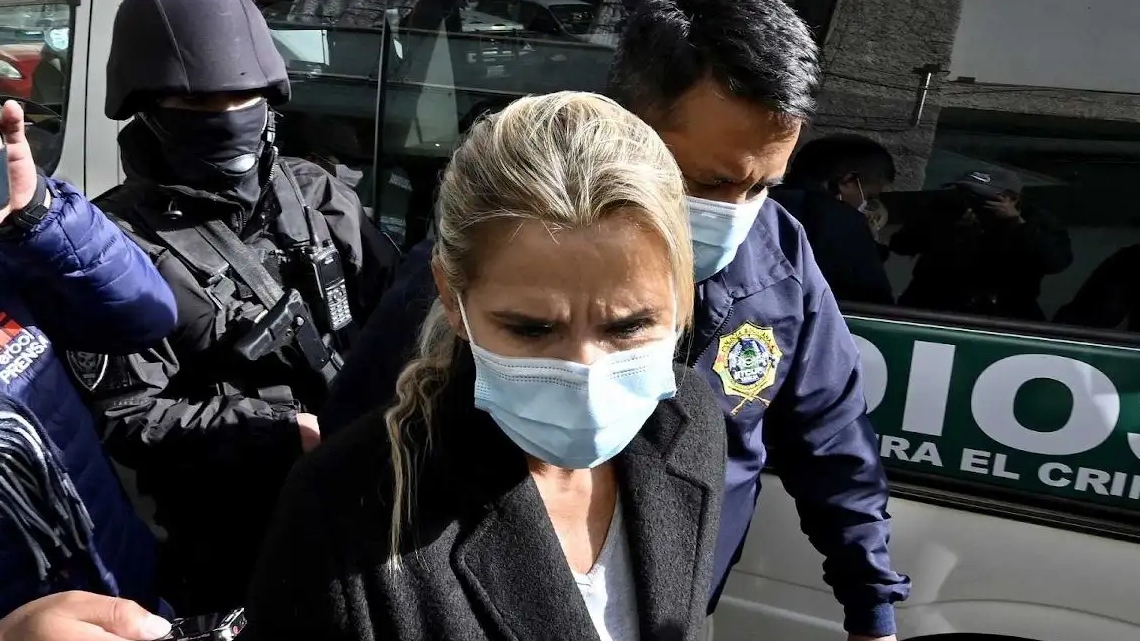The Executive Committee of the Permanent Assembly of Human Rights of Bolivia (APDHB), on August 24, alerted that a plan to escape former de-facto president Jeanine Áñez is being organized by the main opposition leaders and some embassies in the country.
In a statement, signed by the organization’s vice-president Edgar Salazar Limachi and secretary Alfredo Chávez Parra, the APDHB said that it “denounces before the Bolivian people that a possible escape of Mrs. Jeanine Áñez Chávez, who is being held in the Miraflores women’s prison, is underway. It is being orchestrated by opposition leaders such as Jorge Tuto Quiroga, Carlos Mesa Gesbeth, Luis Fernando Camacho, Samuel Doria Medina, and the Pro Santa Cruz Civic Committee.” The organization also mentioned that the escape plan is being coordinated by right-wing activist Amparo Carvajal Baños “under the complicity of some embassies in the country.”
In recent days, after Áñez’s suicide attempt in jail on August 21, the mainstream media has amplified the pleas of her children and allies, asking that she be transferred to house arrest on medical grounds. In the face of the possibility that this request will be granted and used by her as an opportunity to flee to evade justice, the APDHB said it would be watchful in the event of an escape attempt.
The human rights organization declared that it would not allow those responsible for the murder of 37 people killed in the Sacaba and Senkata massacres and the persecution and torture of hundreds of other people to go unpunished. “We will accompany the victims of Sacaba and Senkata before all national and international judicial bodies until those responsible for the massacres of 2019 are found guilty,” stressed the APDHB.
It is important to note that Áñez tried to run away from Bolivia twice in the last ten months. The first time was on November 23, 2020, when the process to seek justice for the numerous crimes committed by former ministers and officials of the coup-installed government had just begun by the democratically elected government of President Luis Arce. At the time, she was prevented from boarding a plane by a group of representatives of various social organizations at the Jorge Henrich Arauz airport in Trinidad city in the Beni department.
The second time was on March 13, after the Prosecutor’s Office ordered her detention and charged her with “terrorism, sedition and conspiracy” concerning the plotting and execution of the coup d’état in November 2019 carried out by the right-wing forces and supported by the armed forces against the then president Evo Morales and forced him to leave the country. This time again, Áñez had a plane ready to flee to Brazil, but the search operation to arrest her prevented her from carrying out her plan. At the time of her detention, she was found hiding inside a bed in a relative’s house outside Trinidad city.
Last Saturday, three days after the Interdisciplinary Group of Independent Experts of Bolivia (GIEI-Bolivia) confirmed in its report that the coup-installed regime led by Áñez was responsible for massacres, torture, persecution, illegal detention, and summary executions of those who took to the streets in rejection of the coup and in support of Morales’ government, and the Prosecutor’s office charged her with “genocide” that could punish her with 20 years in prison, Áñez tried to kill herself. Hours later, the authorities reported that she was stable, her injuries were superficial, she suffered from hypertension but had no severe condition that could risk her life.
While Áñez’s family alleged that she suffers from “severe depression” and asked the government to transfer her to a hospital for treatment, for the past two days, the inmates of the Miraflores prison have been protesting against the special privileges she enjoys. According to the reports by Kawsachun News, Áñez’s prison cell is significantly more luxurious than those for the general population. She has two beds, a desk, a breakfast area, and a private bathroom. She is also entitled to unlimited visits, and her family members are allowed to stay with her at night.
Áñez, who illegally seized power after Morales’ departure and declared herself “interim president” in a session of Congress that met without a quorum, also faces charges of “breach of duties” and “resolutions contrary to the Constitution and the laws.”
Yesterday, on August 25, vice-minister of the interior and police Nelson Cox, in conversation with Radio Kawsachun Coca, said that the opposition leaders are pressing for Áñez’s release because they are afraid that she will say something in the court that will put them in trouble. “Those who seek her freedom are fearful that she may speak during the trial of her responsibilities that have begun regarding the coup d’état and the massacres of Huayllani (Sacaba) and Senkata. If Áñez speaks, other former authorities will fall and that is what they want to avoid,” said Cox.
In an interview with Red Patria Nueva, Cox clarified that “she is in jail not only because she did not respect the State’s Political Constitution, but because she was a de-facto president, and in March she tried to escape. For this reason, she is in preventive detention, complying with a procedure that every person deprived of liberty must comply with.”





